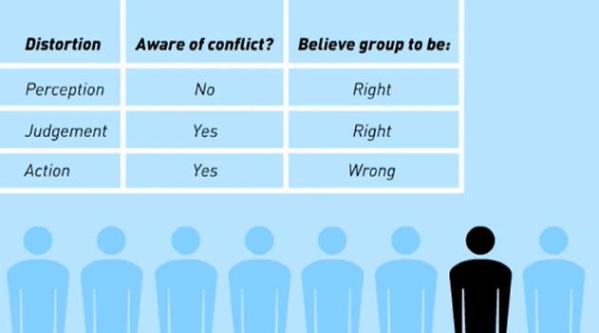


The Bystander Effect: Old Experiments Still Relative To Today’s Social Influences
And there you have a group of (effectively) strangers who were exerting the pressure not to intervene, not to help; and it’s very difficult to rebel!” This Bystander Effect is demonstrated in the following video [3 min.]: Using Other People’s Behavior As Clues To Reality There are, in fact, many reasons why bystanders in groups fail to act in emergency situations, but social psychologists have focused most of their attention on two major factors. According to a basic principle of social influence, bystanders monitor the reactions of other people in an emergency situation to see if others think that it is necessary to intervene. Each person uses others’ behavior as clues to reality. Since everyone is doing exactly the same thing (nothing), they all conclude from the inaction of others that help is not needed. This is an example of pluralistic ignorance or social proof. The other major obstacle to intervention is known as diffusion of responsibility. This occurs when observers all assume that someone else is going to intervene and so each individual feels less responsible and refrains from doing anything.” Bystander Effect Extends To Cyberspace The bystander effect also extends beyond reality and into cyberspace. Specifically, in a study performed by Markey (2000), the experiment focused on the amount of time it took a bystander to provide assistance. The researchers examined the effects of the gender of an individual seeking help by measuring participant response time (dependent variable). The perceived gender was manipulated by the usage of a male or female screen name in an Internet chat room (independent variable). The treatment conditions examined the number of...
New Twitter Study Shows Global Happiness On The Decline
In case you didn’t know, or have yet to receive a tweet about it, twitter is now being used for research. For instance at Cornell University a study was conducted which looked through over 500 million tweets to gauge users moods throughout the day: It turns out that we start our days positively (positive tweets), then our moods begin to decline throughout the day (at around midnight they pick back up again). A more recent study at the University of Vermont has also been conducted in which, “… more then 46 billion words written in Twitter tweets by 63 million Twitters users around the globe…” were analyzed. From this the researchers immersed themselves in a new perspective, In these billions of words is not a view of any individual’s state of mind. Instead, like billions of moving atoms add up to the overall temperature of a room, billions of words used to express what people are feeling resolve into a view of the relative mood of large groups.” Like in the Cornell study, The Vermont team then took these scores and applied them to the huge pool of words they collected from Twitter. Because these tweets each have a date and time, and, sometimes, other demographic information—like location—they show changing patterns of word use that provides insights in the way groups of people are feeling.” The implications of such research? The new approach lets the researchers measure happiness at different scales of time and geography… and stretched out over the last three years, these patterns of word use show a drop in average happiness.” So, the Cornell study measured...![Is It Time To Look Beyond Capitalism Toward A New Social Order? [RSA Video]](http://www.mutualresponsibility.org/wp-content/uploads/2012/03/capitalism_600px-1.jpg)
Is It Time To Look Beyond Capitalism Toward A New Social Order? [RSA Video]
Is it time to look beyond capitalism towards a new social order that would allow us to live within a system that could be responsible, just and humane?” Professor David Harvey, PhD, researches to figure out the role of crises in the whole history of capitalism and what’s specific and special about the crisis this time around” by looking at “the internal contradictions of capital accumulation.” An Internal Contradiction Of Capital Accumulation Financial profits in the United States were soaring after the 1990s” while “profits in manufacturing were coming down … you can see the imbalance … you’ve screwed industry to keep financiers happy,” and as a result “the wealth of the rich … has accelerated.” How Did This Happen? Since the 1970s, we have been in a phase that we call wage repression.” If you diminish wages, where is your demand going to come from?” The answer was, well … get out your credit cards.” Capitalism Never Solves Its Crises Problems, It Moves Them Around Geographically Out of this comes a theory which is very, very important: that capitalism never solves its crises problems, it moves them around geographically.” In other words, you had a finance crisis … you sort of half solved that, but … at the expense of a sovereign debt...
